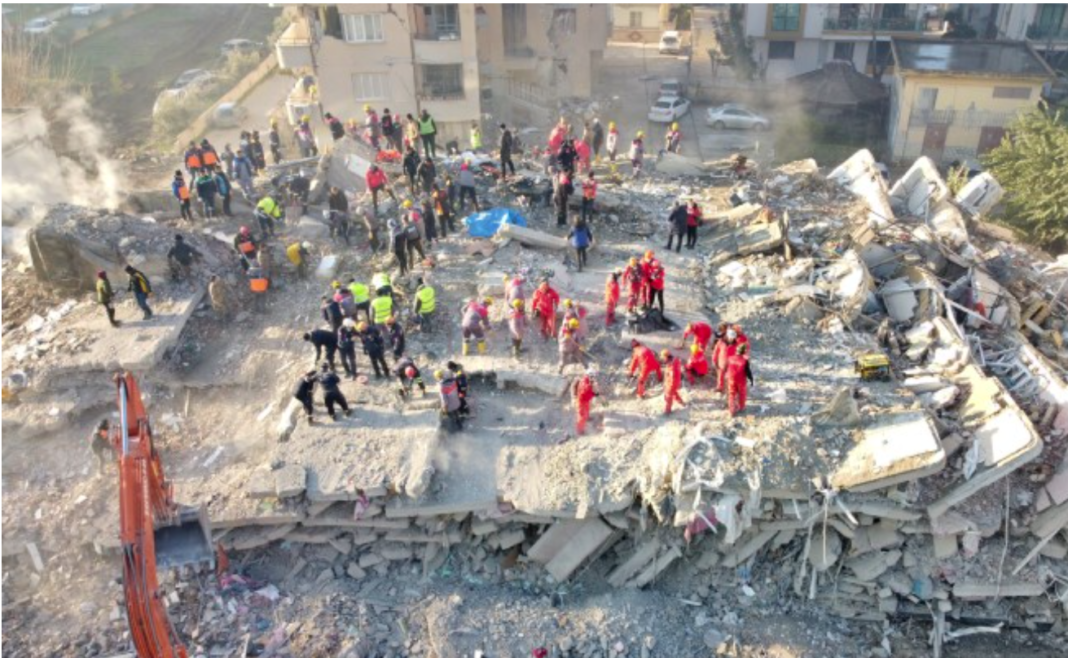« The impact of the earthquake in Turkey and Syria will continue to be felt in the year to come. » Marc Pierini’s analysis in Carnegie on February 7, 2023.
On February 6, a series of earthquakes brought devastation and sorrow to populations in both Syria and Turkey. Thousands of people were killed (by midday on February 7, the death toll was estimated at over 5,000 people), while widespread destruction and cold weather demoralized the survivors. Not surprisingly, this made it all the more likely that politics would soon come to the fore.
The first reaction was assessing the sheer magnitude of the earthquake. Damage was registered from northeast Cyprus all the way to Erzurum in northeastern Anatolia, and also encompassed the northwest of Syria. The entire population of this area is around 19 million. With some airports and many roads out of service, power lines destroyed, overwhelming demands on state services and civil organizations, and foreign aid rushing in, it was inevitable that a period of near-chaos would follow the catastrophe, adding to the grief and suffering of the populations affected. Yet, it is a good thing that Turkey and Syria appealed for foreign assistance and it is comforting to see that many rescue teams have already arrived and others are on their way. However, sadly, the population on both sides of the Turkish-Syrian border will go through a period of lasting hardship in the months to come.
An earthquake straddling a region already ridden with military conflicts is by nature all the more difficult to cope with. The expectation is that all military forces involved in the region—the Russian, Syrian, and Turkish militaries, as well as Kurdish and anti-Assad forces—must observe an immediate de facto ceasefire that will last for as long as rescue operations are under way. Cross-border humanitarian operations from Turkey to Syria, already authorized by virtue of a United Nations understanding, should be vastly increased. The port and airport of Lataqiyya should be opened to humanitarian operations under UN supervision. However, this will require flexibility on the part of the governments in Damascus and Moscow.
This leads to a third comment about the potential inequity in international donors’ treatment of Syria as compared to Turkey. The risks involved due to military operations by a variety of actors, the preexisting damage to transport and sanitary infrastructures in the north of Syria, and the actions of the Syrian regime against its own population during twelve years of conflict may result in a less than warranted aid flow to the country. The Syrian authorities requested help early on, but they should now formally pledge full and transparent cooperation with aid donors, while the UN should act as a guarantor of the safe passage of humanitarian aid and its efficient distribution.
The devastation in Syria and Turkey has one common feature. Whether they exist or not, anti-seismic norms and standards, translated into requirements for building permits, are often disregarded due to endemic corruption, vested interests, and real estate speculation. The collapse of thousands of buildings, including a state hospital in Turkey, has already ignited a political fight. It will take time for policymakers to draw lessons and formulate useful recommendations, but in the medium term the Turkish leadership will probably not escape a volley of fierce criticism from the country’s political opposition and from the general public. The rapid expansion of infrastructure has been a hallmark of President Recep Tayyip Erdoğan’s Justice and Development Party (AKP) for 20 years, and has literally covered the country with new highways, airports, hospitals, along with a boom in urban housing construction. However, this might well backfire for the AKP, with questions raised about the enforcement of anti-seismic building standards, or suspicions that public contracts were awarded to political cronies, who built substandard social housing.
A more immediate uncertainty might shape Turkey’s political landscape in the days to come. With an impacted population of about 16 million out of 86 million throughout the country, of whom possibly tens of thousands now find themselves homeless, with all their belongings now under rubble, including their identity papers, and with many administrative buildings wrecked, will it be possible to organize fair presidential and legislative elections on May 14, as scheduled?
This is now an open question. Solidarity and quick humanitarian assistance are the order of the day. But the shock waves of the earthquake will continue to affect the Turkish political landscape for months to come.
Carnegie, February 7, 2023, Marc Pierini.

